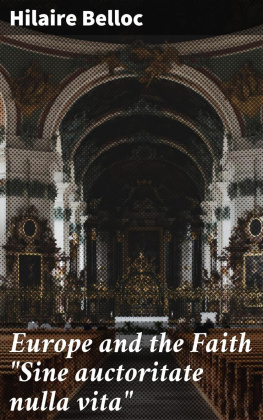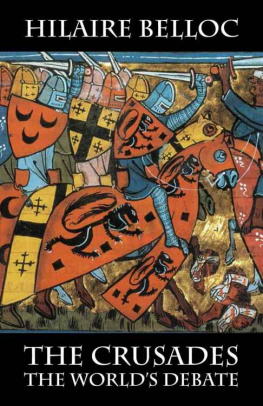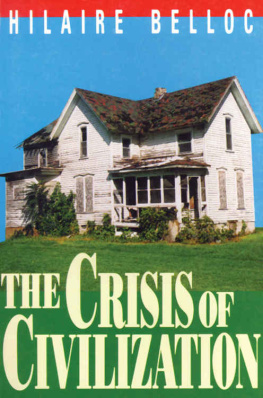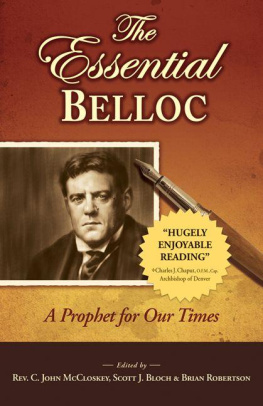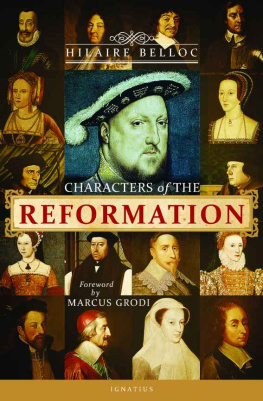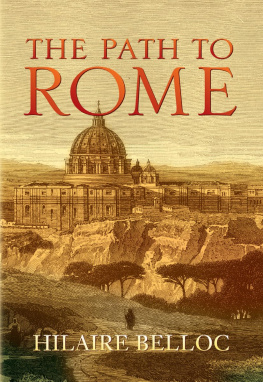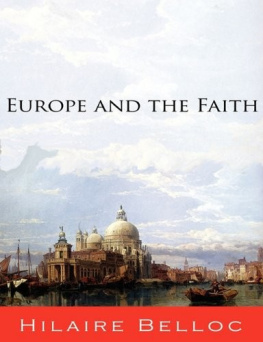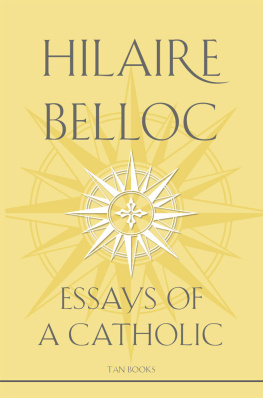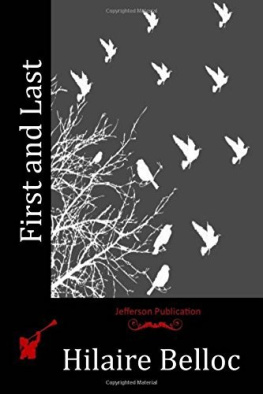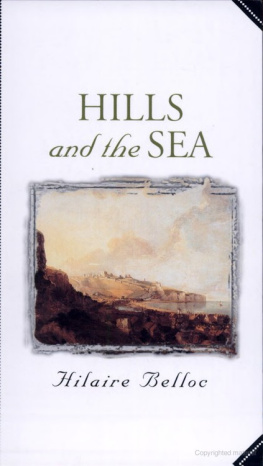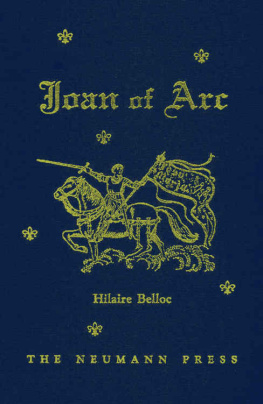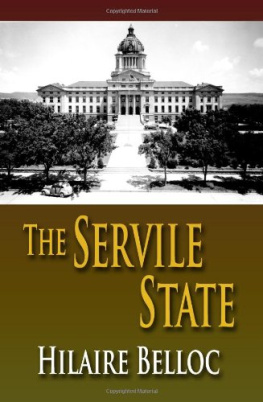INTRODUCTION
Table of Contents
THE CATHOLIC CONSCIENCE OF HISTORY
I say the Catholic "conscience" of historyI say "conscience"that is,an intimate knowledge through identity: the intuition of a thing which isone with the knowerI do not say "The Catholic Aspect of History." Thistalk of "aspects" is modern and therefore part of a decline: it is false,and therefore ephemeral: I will not stoop to it. I will rather do homageto truth and say that there is no such thing as a Catholic "aspect"of European history. There is a Protestant aspect, a Jewish aspect, aMohammedan aspect, a Japanese aspect, and so forth. For all of these lookon Europe from without. The Catholic sees Europe from within. There is nomore a Catholic "aspect" of European history than there is a man's "aspect"of himself.
Sophistry does indeed pretend that there is even a man's "aspect" ofhimself. In nothing does false philosophy prove itself more false. Fora man's way of perceiving himself (when he does so honestly and after acleansing examination of his mind) is in line with his Creator's, andtherefore with reality: he sees from within.
Let me pursue this metaphor. Man has in him conscience, which is the voiceof God. Not only does he know by this that the outer world is real, butalso that his own personality is real.
When a man, although flattered by the voice of another, yet says withinhimself, "I am a mean fellow," he has hold of reality. When a man, thoughmaligned of the world, says to himself of himself, "My purpose was just,"he has hold of reality. He knows himself, for he is himself. A man does notknow an infinite amount about himself. But the finite amount he does knowis all in the map; it is all part of what is really there. What he does notknow about himself would, did he know it, fit in with what he does knowabout himself. There are indeed "aspects" of a man for all others exceptthese two, himself and God Who made him. These two, when they regard him,see him as he is; all other minds have their several views of him; andthese indeed are "aspects," each of which is false, while all differ. Buta man's view of himself is not an "aspect:" it is a comprehension.
Now then, so it is with us who are of the Faith and the great story ofEurope. A Catholic as he reads that story does not grope at it fromwithout, he understands it from within. He cannot understand it altogetherbecause he is a finite being; but he is also that which he has tounderstand. The Faith is Europe and Europe is the Faith.
The Catholic brings to history (when I say "history" in these pages I meanthe history of Christendom) self-knowledge. As a man in the confessionalaccuses himself of what he knows to be true and what other people cannotjudge, so a Catholic, talking of the united European civilization, when heblames it, blames it for motives and for acts which are his own. He himselfcould have done those things in person. He is not relatively right in hisblame, he is absolutely right. As a man can testify to his own motive socan the Catholic testify to unjust, irrelevant, or ignorant conceptionsof the European story; for he knows why and how it proceeded. Others, notCatholic, look upon the story of Europe externally as strangers. Theyhave to deal with something which presents itself to them partially anddisconnectedly, by its phenomena alone: he sees it all from its centre inits essence, and together.
I say again, renewing the terms, The Church is Europe: and Europe is The
Church.
The Catholic conscience of history is not a conscience which begins withthe development of the Church in the basin of the Mediterranean. Itgoes back much further than that. The Catholic understands the soil inwhich that plant of the Faith arose. In a way that no other man can, heunderstands the Roman military effort; why that effort clashed with thegross Asiatic and merchant empire of Carthage; what we derived from thelight of Athens; what food we found in the Irish and the British, theGallic tribes, their dim but awful memories of immortality; what cousinshipwe claim with the ritual of false but profound religions, and even howancient Israel (the little violent people, before they got poisoned,while they were yet National in the mountains of Judea) was, in the olddispensation at least, central and (as we Catholics say) sacred: devoted toa peculiar mission.
For the Catholic the whole perspective falls into its proper order. Thepicture is normal. Nothing is distorted to him. The procession of our greatstory is easy, natural, and full. It is also final.
But the modern Catholic, especially if he is confined to the use ofthe English tongue, suffers from a deplorable (and it is to be hoped),a passing accident. No modern book in the English tongue gives him aconspectus of the past; he is compelled to study violently hostileauthorities, North German (or English copying North German), whoseknowledge is never that of the true and balanced European.
He comes perpetually across phrases which he sees at once to be absurd,either in their limitations or in the contradictions they connote. Butunless he has the leisure for an extended study, he cannot put his fingerupon the precise mark of the absurdity. In the books he readsif theyare in the English language at leasthe finds things lacking which hisinstinct for Europe tells him should be there; but he cannot supply theirplace because the man who wrote those books was himself ignorant of suchthings, or rather could not conceive them.
I will take two examples to show what I mean. The one is the presentbattlefield of Europe: a large affair not yet cleared, concerning allnations and concerning them apparently upon matters quite indifferent tothe Faith. It is a thing which any stranger might analyze (one would think)and which yet no historian explains.
The second I deliberately choose as an example particular and narrow: anespecially doctrinal story. I mean the story of St. Thomas of Canterbury,of which the modern historian makes nothing but an incomprehensiblecontradiction; but which is to a Catholic a sharp revelation of thehalf-way house between the Empire and modern nationalities.
As to the first of these two examples: Here is at last the Great War inEurope: clearly an issuethings come to a head. How came it? Why these twocamps? What was this curious grouping of the West holding out in desperateAlliance against the hordes that Prussia drove to a victory apparentlyinevitable after the breakdown of the Orthodox Russian shell? Where lay theroots of so singular a contempt for our old order, chivalry and morals, asBerlin then displayed? Who shall explain the position of the Papacy, thequestion of Ireland, the aloofness of old Spain?
It is all a welter if we try to order it by modern, externalespeciallyby any materialist or even skepticalanalysis. It was not climate againstclimatethat facile materialist contrast of "environment," which is thecrudest and stupidest explanation of human affairs. It was not raceifindeed any races can still be distinguished in European blood save broadand confused appearances, such as Easterner and Westerner, short and tall,dark and fair. It was notas another foolish academic theory (popular someyears ago) would pretendan economic affair. There was here no revolt ofrich against poor, no pressure of undeveloped barbarians against developedlands, no plan of exploitation, nor of men organized, attempting to seizethe soil of less fruitful owners.


